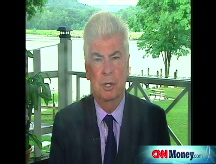Bad week ahead for banks
Analysts expect more writedowns from Citi and Merrill. The IndyMac failure and problems with Fannie and Freddie could further darken the outlook for banks.
NEW YORK (CNNMoney.com) -- If this weekend's news about Fannie Mae and Freddie Mac and Friday's IndyMac failure weren't scary enough, now Wall Street will have to contend with what is likely to be dismal quarterly results from many top financial firms.
Merrill Lynch (MER, Fortune 500) and Citigroup (C, Fortune 500) are each expected to report another quarterly loss. Merrill's results are due out Thursday afternoon while Citigroup will report its results Friday morning.
Analysts expect profits at other big banks, such as Wells Fargo (WFC, Fortune 500) and JPMorgan Chase (JPM, Fortune 500), to fall sharply from a year ago. Wells Fargo's second-quarter results are due out Wednesday morning and JPMorgan Chase will report its numbers Thursday.
The bad news is likely to be repeated next week as well. Profits for Bank of America (BAC, Fortune 500), due out on July 21, are expected to be less than half of what they were just a year ago. And Wachovia (WB, Fortune 500), which will report its results on July 22, warned last week that it expected to lose anywhere between $2.6 billion and $2.8 billion during the second quarter.
"It is difficult in this environment for anybody to be too optimistic," said Tom Kersting, financial services analyst at Edward Jones.
The familiar, yet nagging, problem of credit remains the biggest problem for most banks.
Analysts and portfolio managers that keep close tabs on the banking sector expect most financial institutions to report further deterioration across their mortgage portfolios.
As a result, banks will most likely have to set aside more cash to compensate for bad loans. Washington Mutual (WM, Fortune 500) and Bank of America did that in the first quarter.
There's also the grim reality of writedowns. Several major financial institutions will once again have to go through the painful process of witting down the value of their assets, particularly those related to mortgage-backed securities, leveraged loan portfolios and bond insurers Ambac and MBIA.
Earlier this month, Oppenheimer & Co. analyst Meredith Whitney warned that she expects Merrill Lynch to take $5.8 billion in writedowns and Citigroup to mark down its balance sheet by $12.2 billion.
Analysts will also be paying particularly close attention to banks' credit card and auto loan portfolios for any signs of rising delinquencies.
However, financial institutions tend to report an improvement in credit conditions during the second quarter, helped by tax refunds, Citigroup analyst Keith Horowitz pointed out in a note published Friday.
And given this year's economic stimulus package, that could bode well for banks' loan portfolios as consumers try to keep from falling behind on payments. Horowitz wrote that there could be a "reprieve from the rapid pace of delinquency."
Analysts say that banks may also see some benefit from the Federal Reserve's drastic rate-cutting campaign since last September. Lower interest rates have driven down the short-term borrowing costs for banks. That should boost their net interest margins, or the profits they make from taking in deposits and lending them back out.
During the first quarter, the country's nearly 8,500 domestic insured depository institutions reported a 9.6% jump in net interest income from a year ago, to nearly $95 billion, according to the Federal Deposit Insurance Corp.'s most recent quarterly banking report.
But what little in the way of good news banks have to report may be overshadowed by some major announcements about raising more capital.
Several banks raised cash earlier this year by selling stakes to private-equity firms and sovereign wealth funds. Analysts think there could be similar announcements during earnings reports....and maybe even some asset sales.
There has been plenty of speculation, for example, that Merrill Lynch will unveil a major capital raising initiative, including plans to sell all, or part, of its stakes in asset manager BlackRock or the media outlet Bloomberg LP.
Facing pressure from regulators to shore up their books by raising capital, other financial institutions could follow suit, said Chris Hagedorn, a portfolio manager at Fifth Third Asset Management, which owns shares of Bank of America, JPMorgan and Wells Fargo among other banks.
"I think it is a distinct possibility depending on how big the writedowns are and how much deterioration companies are seeing in their capital ratios," he said.
Finally, banks face a lot of uncertainty about the fates of Fannie Mae and Freddie Mac.
On the one hand, the proposal from the Treasury Department and the Federal Reserve over the weekend to prop up the two mortgage finance giants should be good news.
The two government-sponsored enterprises provide a crucial source of funding for banks and other lenders by purchasing mortgages they originate.
But at the same time, banks and other financial institutions own more than $1 trillion of the mortgage-backed securities that Fannie and Freddie sell to investors all over the world.
Were Fannie and Freddie to enter into default, banks would then find themselves on the hook for those home loans they first originated and would most likely have to raise billion of dollars in additional capital.
"That would probably put more pressure on many of the banks," said Frank Barkocy, director of research with Mendon Capital Advisors, a firm that invests primarily in financial stocks. "You have to have the capital to backstop those loans." ![]()



